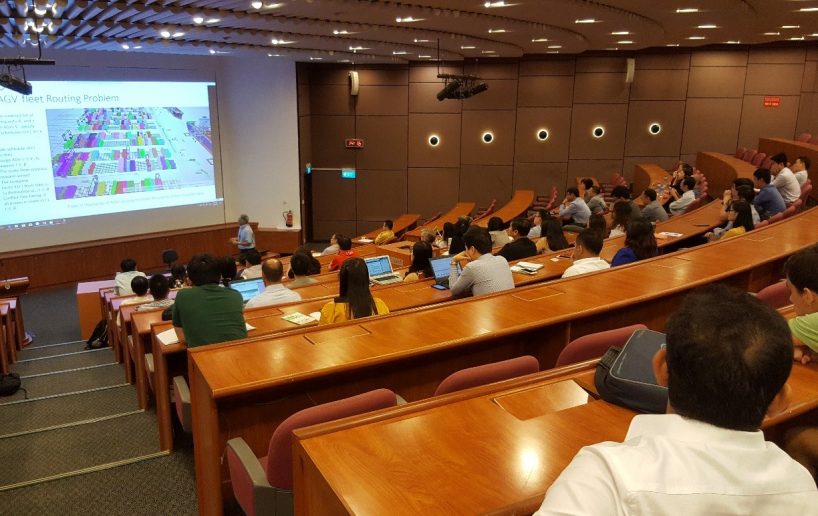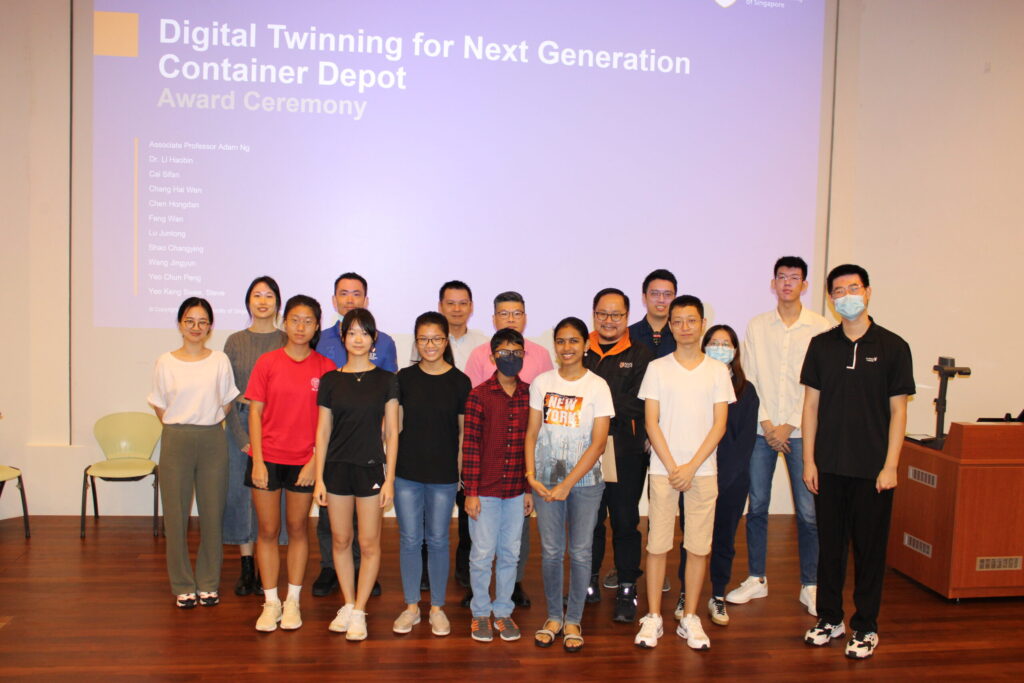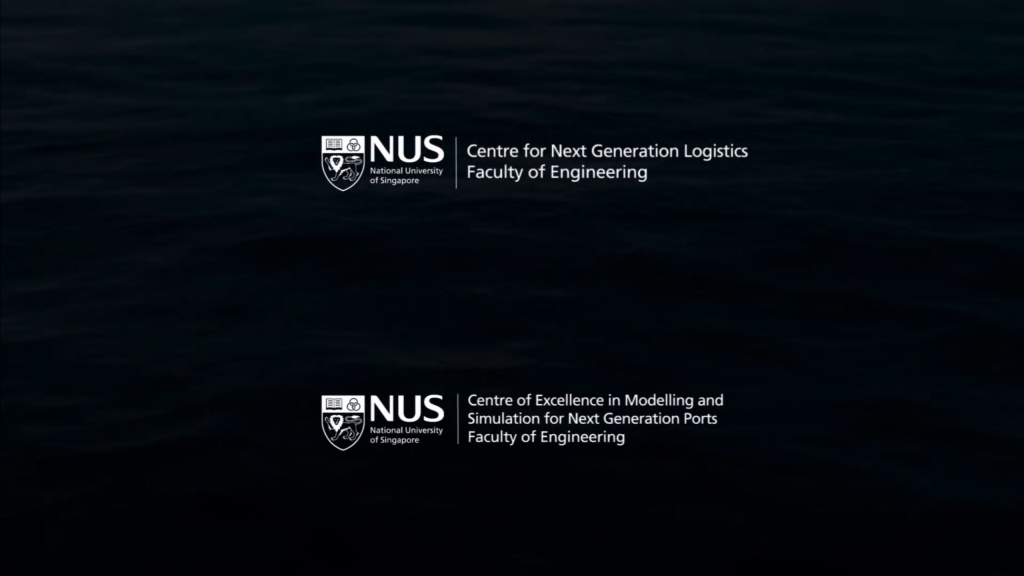
Digital Twin for Smart Systems
“Singapore has started her journey in the Smart Nation Initiative and it is important to create a digital twin for the system in order for the development of the “Smartness” in the system. In this Workshop we will share this digital twin Concept for Smart Systems which will enable users to develop data-enabled intelligence in the system. The data we collect from the system and the date generated by the digital twin are able to help us to proactively make effective decisions.”
The centre held its first workshop of the year on “Digital Twin for Smart Systems” on the 14th of March, 2018 in the Engineering Auditorium. After a brief introduction of the centre, future smart systems, and their use to control, optimise, and solve industry problems are the main topics discussed, with our guest speakers, Professor Victor Jorge Leon from Texas A & M University, Associate Professor Lim Yun Fong from Singapore Management University, and Mr Loong Meng Onn from SimTech A*Star covering topics from “Deadlock-free and Congestion-free AGV-Fleet Routing Using Bidirectional Acyclic Graphs and Resource-Constrained Route-Schedule Generation”, to “Matching Supply with Demand for Online Retailing” and “Model Factory@SIMTech – A Smart Factory for Manufacturing Control Tower™”. We rounded-up the workshop with our very own Associate Professor Lee Loo Hay sharing the concept of digital twin in helping in the decision making process, and Research Assistant Professor Li Haobin sharing our digital twin simulation and optimisation platform capabilities, the O2DES platform, and its applications in his “Introduction to Discrete-Event Digital Twins: Bridge AI for Industrial Systems”. Over 100 participants from 32 companies attended. We would like to thank all participants for joining us in this workshop, and we hope to see you again in our next instalment!
Abstracts
Deadlock-free and Congestion-free AGV-Fleet Routing Using Bidirectional Acyclic Graphs and Resource-Constrained Route-Schedule Generation Prof Victor Jorge Leon, Visiting Professor ISEM, NUS & Department of Systems Engineering & Operations Research, Texas A & M University
AGVs constitute a critical component of the material handling system since it couples the quay-side cranes that load/unload vessels with the yard-side cranes that handle containers in the yard area. Modern automated container-ports are designed to move millions of TEUs per year using thousands of AGVs. Operations coordination in very large container ports is complex due to the large-scale of the problem compounded by the inherent uncertainties associated with port operations – planning and scheduling methodologies must be fast and scalable to effectively deal with large-scale planning and allow for frequent dynamic rescheduling.
AGV-fleet routing consists in determining the best route paths given origin/destination requests, and the exact timing of the AGV moving through the path. Here it is assumed that an ordered set of origin-destination pairs, and the number of available AGVs are given. Further, it is assumed that it is desirable to minimize the average time to serve the given trip requests while maximizing the average AGV utilization. Deadlocks and traffic congestion significantly can impact operational effectiveness of the port and must be explicitly handled by the routing methodology.
This talk will present an AGV routing methodology that enables the fast generation of deadlock-free and congestion-free routes and routing schedules by integrating theories from the fields of graph, deadlock, resource-constrained scheduling and vehicle routing. The methodology controls traffic congestion using transit-resource capacity parameters and dynamic congestion index forecasts. Fast deadlock prevention is achieved through a decomposition into finding simple-path sub-problems using a new bidirectional acyclic graph model on a reduced deadlock graph. The methodology’s worst-case running time is polynomial.
Prof. V. Jorge Leon is the Allen-Bradley Professor in Factory Automation at the Texas A&M University, USA, where he holds a joint appointment in the Department of Engineering Technology and Industrial Distribution (ETID) and the Department of Industrial and Systems Engineering (ISEN). He is the director of the Strategic Operations Optimization and Planning research group, and the ETID Associate Department Head for Graduate Studies. Dr Leon publications include articles in top-tier journals in his field, book and book chapters. His projects have been funded nationally and internationally by governmental, state, and private organizations.
Matching Supply with Demand for Online Retailing Dr. Lim Yun Fong , Associate Professor of Operations Management, Lee Kong Chian Fellow at Lee Kong Chian School of Business, Singapore Management University.
The aggressive expansion in e-commerce sales, which will amount to $4.058 trillion by 2020, creates greater challenges to online retailers’ operations. An important characteristic that differentiates online retailers from brick-and-mortar retailers is that the former can choose which fulfillment centers (FCs) to satisfy demand. Although this flexibility improves service levels, it may increase the fulfillment cost and complicates inventory allocation and replenishments to the FCs. Therefore, we consider a joint replenishment, allocation, and fulfillment (JRAF) problem over multiple periods.
A case study with a major apparel online retailer in Asia suggests that the two-stage approach can reduce the retailer’s current cost by 36.73%, demonstrating a significant value of joint optimization. A more general study confirms that the two-stage approach can handle realistic problem sizes and performs very close to a benchmark with perfect information.
Yun Fong LIM is Associate Professor of Operations Management and Lee Kong Chian Fellow at the Lee Kong Chian School of Business, Singapore Management University (SMU). He is also Chang Jiang Chaired Professor and has been an NOL Fellow. Yun Fong’s research has appeared in Operations Research, Management Science, Manufacturing and Service Operations Management, and Production and Operations Management. He has delivered keynote and plenary speeches in several international conferences. In addition, his work has received funding by MOE and A*STAR and media coverage by The Business Times, Channel 8, Capital 95.8, and 93.8 Live. His current research interests include e-commerce and omni-channel retailing, warehousing and fulfillment, inventory management, workforce management, and sustainable urban logistics.
Yun Fong is a recipient of the SMU Teaching Excellence Innovative Teacher Award. He teaches both undergraduate and postgraduate courses in Operations Management. He has provided consulting and executive development to corporations such as Maersk, McMaster-Carr Company, Resorts World Sentosa, Schneider Electrics, and Temasek Holdings. Yun Fong obtained both his PhD and MSc degrees in Industrial and Systems Engineering from the Georgia Institute of Technology.
Model Factory@SIMTech – A Smart Factory for Manufacturing Control Tower™ Mr Loong Meng Onn, Senior Consultant, Manufacturing Productivity Technology Centre, SimTech A*Star
The Model Factory@SIMTech is designed as an actual production environment that enables experimentation and the learning of manufacturing system technologies. Inside of the Model Factory, the Manufacturing Control Tower™ (MCT™) concept demonstrates how digital technologies is utilised to stitch and integrate information across the three layers in manufacturing i.e. Supply Chain, Enterprise and Shop-floor. These data and information is then utilised to optimise and continuously improve the performance of the business.
The Cyber-Physical Production System (CPPS) enables seamless control of the physical production line by demonstrating the benefits from full connectivity and visibility of all operations, resulting in the ability to respond effectively. On-the-go decision support tools demonstrate the ability to be more productive and create higher value-add by leveraging the latest digitalization technologies. This not only supports High-Mix, Low-Volume (HMLV) production but pushes customisation towards a lot size of 1, and with full traceability of an End-to-End Supply Chain.
With a working experience of more than 20 years in the electronics industry, and particularly in the development and continuous improvement of production systems, Meng Onn has now set his sight on applying and transferring his knowledge and experience to benefit local companies and industries. He received his B.Eng. degree in Mechanical & Production Engineering from NTU.
Meng Onn also possesses a wealth of experience as an automation consultant, Lean practitioner, business consulting service, corporate training programme and team facilitation.
As part of the team to develop the Model Factory@SIMTech, he contributed by developing the sensorised Smart Factory that represents the physical portion for the Digital Twin. Since the launch of the Model Factory on 5th October 2017, it has generated considerable interest for businesses keen on embarking on the Industry 4.0 journey.
Introduction to Discrete-Event Digital Twins: Bridge AI for Industrial Systems Dr. Haobin Li, Assistant Professor (Research) ISEM, NUS
The O2DES.Net is a software framework developed by Dr. Li to facilitate integration between simulation modelling and optimization in different ways towards respective industrial needs. With advanced object-oriented and modularized modelling paradigm, the platform enables precise, flexible and collaborative modelling for a wide range of complex industrial system. Innovative optimization algorithms are included in the package, with the potential to adapt to the parallel computing to boost its performance.
With the Centre for Next Generation Logistics (C4NGL), a Warehouse Digital-Twin is recently proposed based on the O2DES.Net framework, aiming to provide timely and affordable solutions to industrial practitioners for warehouse design and operations, in the era of IoT and Industry 4.0.
Dr. Li Haobin is a research assistant professor of the Department of Industrial Systems Engineering and Management in the National University of Singapore, with a strong research focus on the discrete-event simulation (DES) modelling and stochastic simulation optimization. The application of his research studies includes the next generation logistics, maritime port optimization, healthcare, and smart manufacturing. Dr. Li received his B.Eng. degree with 1st Class Honours in June 2009 from the ISE Department of NUS, with minor in computer science; and Ph.D. degree from the same department in February 2014. He has been working as post-doctoral research fellow in the same department, and scientist in the Institute of High-Performance Computing (IHPC) of A*STAR Singapore.
Digital Twin for Smart Systems A/Prof Lee Loo Hay (Co-Director, C4NGL/ C4NGP)
Singapore has started her journey in the Smart Nation Initiative and it is important to create a digital twin for the system in order for the development of the “Smartness” in the system. In this Workshop we will share this digital twin Concept for Smart Systems which will enable users to develop data-enabled intelligence in the system. The data we collect from the system and the date generated by the digital twin are able to help us to proactively make effective decisions.
Loo Hay LEE is Associate Professor in the Department of Industrial Systems Engineering & Management in NUS. He was visiting professor at the Department of Systems Engineering and Operations Research at George Mason University. Dr Lee has also been appointed as the Eastern Scholar Professor for the Shanghai Maritime University by the Shanghai Municipal Education Commission. He received his B.S (Electrical Engineering) degree from the National Taiwan University in 1992 and his S.M and PhD degrees in 1994 and 1997 from Harvard University. He has published around 80 papers in international journals.
He is currently the co-editor for Journal of Simulation and is a member in the advisory board for OR Spectrum. He is a senior member of IEEE, and has served as a council member in the simulation society of INFORMS. His research focuses on the simulation-based optimization, maritime logistics which includes port operations and the modeling and analysis for the logistics and supply chain system. He has co-authored a book: Stochastic Simulation Optimization-Optimal Computing Budget Allocation (World Scientific) and co-edited the book Advances in Maritime Logistics and Supply Chain Systems. He has won the Best Paper Award at the INFOCOMP 2011 and co-lead a team with A/Prof Chew Ek Peng to win the grand prize for the next generation container port challenge in 2013 by proposing a revolutionary double-storey container terminal design, called SINGA Port. He has also served as the assistant dean in charge of research for the Faculty of Engineering of NUS from 2001 to 2003 and was deputy head of research for the department.




